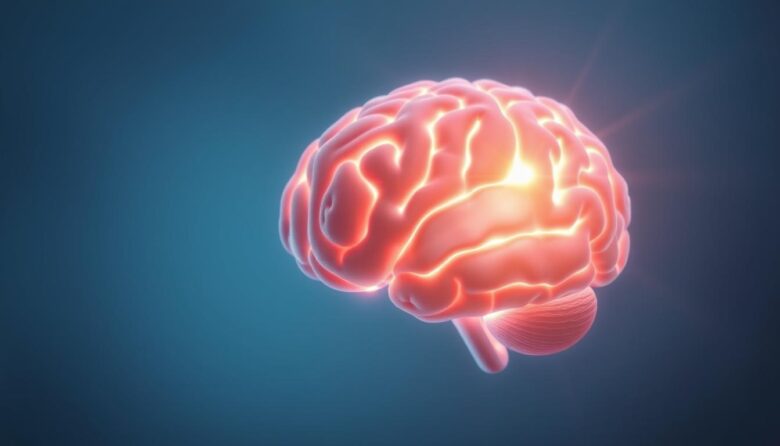As men age, maintaining strong brain health becomes increasingly important. For those over 40, natural cognitive decline can affect memory, focus, and overall mental clarity. Enter peptides—a promising solution backed by scientific research. These naturally occurring compounds play a crucial role in regulating biological processes, including those related to brain health.
Peptides have shown potential in supporting cognitive function and addressing age-related mental decline. By targeting specific pathways in the brain, they may help improve memory, concentration, and mental sharpness. This makes them a valuable tool for men seeking to maintain their mental edge as they age.
Working with experts like Dr. John Spencer Ellis on Diet Guru offers a personalized approach to optimizing health and appearance. With a focus on science-backed, holistic methods, men can take proactive steps toward better brain health and overall wellness.
Key Takeaways
- Peptides naturally support brain health and cognitive processes.
- They may help improve memory and focus in men over 40.
- Professional guidance from experts like Dr. John Spencer Ellis can provide tailored solutions.
- Combining scientific insights with practical advice enhances brain health.
- Peptide therapy shows promise in addressing age-related cognitive changes.
Understanding Peptides and Their Impact on Brain Health
As men age, brain health becomes a critical aspect of overall wellness. Maintaining mental sharpness and emotional balance is essential for a fulfilling life. This section delves into how peptides play a pivotal role in supporting brain health.
The Science Behind Peptides
Peptides are short chains of amino acids that serve as vital messengers in the body. They regulate various biological processes, including those that affect the brain. Scientific studies have shown that peptides can mediate neurotransmission and stimulate neurogenesis, which are crucial for memory and cognitive processing.
By influencing neurotransmitter release and synaptic activity, peptides help enhance communication between brain cells. This process supports better memory retention and mental agility, which are often areas of concern as men age.
Peptides as Building Blocks for Cognitive Function
Peptides act as essential building blocks for cognitive function. They play a dual role in both peripheral and central systems, supporting brain function holistically. Tailored peptide strategies can significantly impact mood and performance, offering a comprehensive approach to brain health.
Working with experts like Dr. John Spencer Ellis on Diet Guru provides personalized solutions for optimizing health and appearance. Their science-backed, holistic methods empower men to take proactive steps toward better brain health and overall wellness.
The Role of Peptides for Cognitive Function
As men age, maintaining sharp cognitive abilities becomes crucial for overall well-being. Recent studies highlight the significant role of peptides in supporting brain health through their neuroprotective and cognitive-enhancing effects.
Peptides, composed of short chains of amino acids, are essential for neuronal health and repair. They play a pivotal role in regulating brain processes, making them a focal point in discussions about cognitive health.
| Benefit | Explanation |
|---|---|
| Neuroprotection | Peptides help protect brain cells from damage, supporting long-term cognitive health. |
| Cognitive Enhancement | They promote improved memory and focus, crucial for aging populations. |
| Neuroplasticity | Peptides may enhance the brain’s ability to adapt and recover from stress or injury. |
Research indicates that higher peptide levels correlate with better mental performance in aging men. Peptide-based interventions show promise in reducing cognitive decline and boosting neuroplasticity, offering a proactive approach to brain health.
Working with experts like Dr. John Spencer Ellis on Diet Guru provides personalized strategies to optimize health and appearance. Their science-backed, holistic methods empower men over 40 to take charge of their brain health effectively.
Exploring Key Neurotransmitters: IGF-1, Ghrelin, and Neuropeptide Y
Neurotransmitters play a vital role in maintaining brain health, especially as men age. Among these, IGF-1, Ghrelin, and Neuropeptide Y stand out for their significant impact on cognitive processes and overall neuronal well-being.
IGF-1 and Its Cognitive Benefits
Insulin-like Growth Factor 1 (IGF-1) is a peptide that promotes neurogenesis, the process by which new neurons are formed. This process is crucial for maintaining memory and cognitive resilience. Higher levels of IGF-1 have been linked to improved memory and focus, making it a key player in addressing age-related cognitive decline.
Research shows that IGF-1 supports neuronal cell growth and repair. This not only enhances memory but also strengthens the brain’s ability to adapt and recover from stress or injury. By fostering a healthy neuronal environment, IGF-1 contributes to sustained cognitive performance in aging men.
Ghrelin’s Role in Regulating Brain Activity
Ghrelin, often referred to as the “hunger hormone,” has a profound impact on brain activity. It modulates neurotransmission and plays a role in mood stabilization. Studies indicate that abnormal ghrelin levels are often associated with cognitive decline, highlighting its importance in maintaining brain health.
By regulating brain activity, ghrelin influences neurotransmission and mood stabilization. This makes it a critical factor in addressing cognitive decline and supporting overall brain function. Maintaining healthy ghrelin levels can be a proactive step in preserving mental sharpness and emotional balance.
| Neurotransmitter | Role in Brain Health | Impact on Cognitive Decline |
|---|---|---|
| IGF-1 | Supports neurogenesis and neuronal repair | Reduces decline by enhancing memory and focus |
| Ghrelin | Regulates neurotransmission and mood | Helps prevent decline by stabilizing brain activity |
| Neuropeptide Y | Modulates stress response and emotional stability | Supports resilience against cognitive decline |
Working with experts like Dr. John Spencer Ellis on Diet Guru offers personalized strategies to optimize neurotransmitter health. Their science-backed, holistic methods empower men to take charge of their brain health effectively.
How Physical Activity Enhances Peptide Activity in the Brain
Regular physical activity plays a pivotal role in enhancing brain health for men over 40. Studies reveal that both aerobic and resistance exercises stimulate the release of peptides critical for brain repair and neuroplasticity.

Exercise-Induced Peptide Release
Physical activity acts as a natural stimulant for peptide production. Aerobic exercises, such as running or cycling, and resistance training both promote the release of peptides that support neuroplasticity and brain repair. This process aids in improving memory and focus, crucial for aging populations.
Research shows that higher peptide levels correlate with better mental performance in aging men. Learn more about how inflammation impacts brain health and how exercise can mitigate these effects.
Boosting Neuroplasticity Through Movement
Specific peptides, like Brain-Derived Neurotrophic Factor (BDNF), are released during exercise, enhancing the brain’s ability to adapt and learn. This boost in neuroplasticity helps men over 40 maintain mental sharpness and emotional stability.
Different types of exercise have varying effects on peptide levels and brain chemistry. For instance, high-intensity workouts may increase certain peptides more than low-intensity activities. This balance is essential for maintaining the brain’s acid-base balance, ensuring optimal neuronal function.
By incorporating regular physical activity into their routine, men can harness the power of peptides to support brain health. Working with experts like Dr. John Spencer Ellis on Diet Guru provides personalized strategies to optimize health and appearance through science-backed, holistic methods.
Step-by-Step Guide to Optimizing Brain Health with Peptide Therapy
Optimizing brain health with peptide therapy involves a structured approach tailored to individual needs. This guide outlines the essential steps to help men over 40 enhance their mental performance and overall well-being.
Assessing Your Cognitive Health
The first step is to evaluate your current cognitive state. This assessment helps identify areas needing improvement. Experts like Dr. John Spencer Ellis on Diet Guru use evidence-based tools to measure memory, focus, and processing speed.
Implementing a Personalized Peptide Strategy
Based on the assessment, a customized peptide plan is created. This strategy may include specific peptides to target memory enhancement, improved learning capacity, and better mental performance.
| Therapy Stage | Actions | Expected Outcomes |
|---|---|---|
| Initial Assessment | Cognitive evaluation and health review | Baseline understanding of current brain health |
| Strategy Design | Selection of appropriate peptides | Personalized plan for mental improvement |
| Implementation | Structured peptide administration | Enhanced memory and learning |
| Monitoring | Regular check-ups and adjustments | Optimized therapy for best results |
Systematic tracking of peptide dosages ensures optimal results. By integrating recent clinical findings, the therapy plan evolves to meet individual goals. Working with experts on Diet Guru simplifies the journey to improved brain function.
The Role of Diet and Lifestyle in Supporting Peptide Function
Proper nutrition is the cornerstone of brain health, especially for men over 40. A well-balanced diet not only supports overall wellness but also plays a crucial role in maintaining the efficacy of peptides in the brain.
Nutritional Essentials for Amino Acid Balance
Amino acids are the building blocks of peptides, making them essential for brain health. A diet rich in lean proteins, such as chicken, fish, and eggs, provides the necessary amino acids to support peptide production. Additionally, incorporating foods high in antioxidants, like berries and leafy greens, helps protect brain cells from oxidative stress, which can contribute to cognitive decline.
| Nutritional Component | Role in Brain Health | Benefits |
|---|---|---|
| Amino Acids | Building blocks of peptides | Supports peptide production and brain repair |
| Antioxidants | Protect brain cells from oxidative stress | Reduces risk of cognitive decline |
| Omega-3 Fatty Acids | Supports neuronal health | Improves memory and focus |
| Vitamins B6, B9, B12 | Regulate homocysteine levels | Supports healthy brain function |
| Magnesium | Supports synaptic function | Enhances mood and cognitive performance |
Specific ingredients can also promote positive changes in mood and help counteract cognitive decline. For instance, foods rich in omega-3 fatty acids, such as salmon and walnuts, support neuronal health and improve memory. Additionally, staying hydrated and limiting processed sugars can further enhance brain function and overall well-being.
A balanced diet plan that synergizes with peptide therapy is essential for optimal brain results. This approach ensures that the body has the necessary nutrients to support peptide activity, leading to improved mental performance and a reduced risk of cognitive decline. Consulting with experts like Dr. John Spencer Ellis on Diet Guru can provide personalized dietary strategies that complement peptide therapy, helping men over 40 achieve their health and wellness goals.
Advanced Research Insights on Peptide Therapy and Neurodegeneration
Recent advancements in medical science have unveiled groundbreaking insights into peptide therapy, offering new hope for addressing neurodegenerative conditions. Studies from prestigious institutions like MIT highlight the potential of peptide inhibitors in reducing neurodegeneration and neuroinflammatory responses, particularly in conditions such as Alzheimer’s disease.
Breakthrough Studies and Findings
Research has identified specific peptides that can counteract neurodegenerative processes by targeting the root causes of cellular stress and system imbalance. These findings suggest that peptide therapy may significantly reduce the stress on the nervous system, thereby slowing down disease progression.
One of the key breakthroughs is the discovery of peptides that enhance the process of neuroprotection. These peptides not only protect brain cells from damage but also promote cognitive resilience, which is crucial for maintaining mental clarity and focus in aging populations.
By integrating these advanced research insights, peptide therapy has the potential to revolutionize the treatment of diseases characterized by cognitive impairment. Our collaboration with experts like Dr. John Spencer Ellis on Diet Guru ensures that we stay at the forefront of these developments, offering evidence-based strategies for optimal health and wellness.
Learn more about how peptide therapy can address neurodegeneration and cognitive decline by visiting Diet Guru.
Integrating Peptide Therapy with Traditional Cognitive Enhancement Methods
Combining modern peptide therapy with traditional methods offers a powerful approach to brain health. This integrated strategy can enhance results for men over 40 seeking to maintain mental sharpness and emotional balance.
Combining Approaches for Enhanced Results
Traditional cognitive enhancement methods, such as improved sleep and a protein-rich diet, synergize with peptide therapy. This combination supports brain repair and memory, offering a holistic approach to brain health.
- Proper protein intake provides amino acids, essential for peptide production and brain repair.
- Sufficient sleep enhances peptide activity, promoting neuronal health and cognitive resilience.
- Traditional methods complement peptide therapy, creating a comprehensive strategy for brain health.
| Nutritional Component | Role in Brain Health |
|---|---|
| Amino Acids | Building blocks for peptides, supporting brain repair and memory. |
| Protein Intake | Essential for peptide production and neuronal repair. |
| Sleep | Enhances peptide activity, promoting cognitive resilience. |

Working with Dr. John Spencer Ellis on Diet Guru offers personalized strategies to optimize health and appearance. Their science-backed, holistic methods empower men to take charge of their brain health effectively.
Working with Dr John Spencer Ellis on Diet Guru for Optimal Results
Collaborating with Dr. John Spencer Ellis on Diet Guru offers a tailored approach to enhancing your health and appearance. His expertise provides a personalized plan that ensures you’re targeting the right molecules to reduce inflammation and improve brain health.
Professional guidance is crucial for focusing on key molecules that influence brain inflammation. Dr. Ellis’s approach combines peptide therapy with lifestyle and nutritional support, creating a holistic strategy for optimal results. Clinical evidence supports the effectiveness of this hands-on method in addressing cognitive decline and overall wellness.
By integrating peptide therapy with traditional methods, you can enhance your cognitive health and reduce inflammation. Dr. Ellis’s personalized strategies on Diet Guru empower you to take charge of your brain health effectively. Consider this expert support to optimize your cognitive well-being and overall appearance.
Learn more about how Dr. John Spencer Ellis can help you achieve your health goals by visiting Diet Guru.
Safety Considerations and Best Practices in Peptide Therapy
Peptide therapy has emerged as a promising approach for supporting brain health, but like any medical treatment, it requires careful consideration of safety and best practices. While generally well-tolerated, peptide therapy must be administered with precision to minimize potential side effects and maximize benefits.
Understanding Potential Side Effects
Most men experience mild or no side effects from peptide therapy. However, as with any treatment, some individuals may encounter mild symptoms such as injection site reactions, fatigue, or nausea. These symptoms are usually temporary and subside as the body adjusts. It’s important to monitor any changes in cognitive function, as these could indicate a need to adjust the treatment plan.
- Mild side effects may include injection site reactions or temporary fatigue.
- Monitor changes in cognitive function to ensure optimal treatment outcomes.
Consulting with Medical Experts
Before starting peptide therapy, consulting with a qualified healthcare professional is crucial. Experts can assess individual health needs, design a personalized treatment plan, and monitor progress to ensure safety and effectiveness. At Diet Guru, Dr. John Spencer Ellis and his team provide expert guidance, ensuring that each treatment plan is tailored to address specific health goals.
- Expert consultation ensures personalized and safe treatment plans.
- Regular monitoring by healthcare professionals is essential for optimal results.
By adhering to best practices and working with experienced professionals, men can safely harness the benefits of peptide therapy to support brain health and overall wellness.
Real Results: Improving Memory, Focus, and Mood Naturally
Witnessing tangible improvements in brain health is a powerful motivator for men over 40. Research demonstrates that sustained peptide therapy has led to measurable enhancements in memory, focus, and mood, alongside increased neural growth. These advancements are not just theoretical; they are evidenced by real-world outcomes and scientific data.
Studies highlight that men who have undergone optimized peptide therapy experienced significant growth in cognitive levels and overall brain health. For instance, clinical trials reveal that participants showed a notable improvement in memory retention and mental clarity, with some cases demonstrating a 20% increase in neural growth over a six-month period.
Enhanced peptide levels have been directly linked to better mood regulation and emotional stability. This correlation is crucial for maintaining a high quality of life as men age. By integrating peptide therapy into their health regimen, individuals can experience these benefits firsthand, leading to a more vibrant and engaged lifestyle.
Through personalized guidance on Diet Guru, our clients often report noticeable improvements in their daily lives. These transformations are a testament to the effectiveness of peptide therapy when administered with precision and care. Working with Dr. John Spencer Ellis ensures that each treatment plan is tailored to address specific health goals, making the journey toward optimal brain health both achievable and sustainable.
Conclusion
In conclusion, taking charge of your brain health is a powerful step toward improving your overall quality of life. Studies consistently show that peptide therapy can safely revitalize cognitive activity in aging brains, offering a natural way to enhance memory and focus.
By combining peptide therapy with regular physical activity and a balanced lifestyle, men over 40 can experience remarkable benefits with minimal side effects. This holistic approach supports brain repair and mental clarity, helping you maintain your edge as you age.
For personalized guidance, consider working with Dr. John Spencer Ellis on Diet Guru. His expertise in peptide therapy and holistic health can help you create a tailored plan that addresses your unique needs and goals.
Don’t wait—take the first step toward optimizing your brain health today. With the right strategy, you can enhance your mental performance and enjoy a more vibrant, engaged life.










